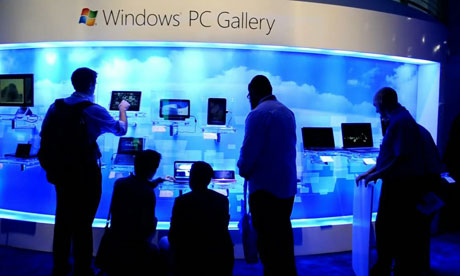
"Unthinkable," said Horace Dedlu, a former manager at Nokia. "These actions confirm the end of the PC era." Steve Ballmer, the head of Microsoft, had just told the giant Consumer Electronics Show (CES) in Las Vegas that the next version of its Windows operating system, used on about 90% of the world's PCs, would run on chips made by the British company Arm.
Great news then for the British company, whose shares spiked, and Ballmer also presented it as good for Microsoft, whose products are used by a billion people around the world.
But as Dedlu sees it, Microsoft has been herded into the move to Arm by huge changes in the computing market that will see power shift from the makers of PCs to the manufacturers of tablet computers.
Companies such as Samsung, which used to focus their hardware efforts on Windows PCs and phones, have started instead making smartphones and tablets running Google's Android.
Samsung says it has sold 1.5m of its Galaxy Tab tablets since mid-October, and it has become the world's fourth-largest handset maker (after Nokia, Apple and BlackBerry creator Research In Motion). Microsoft isn't seeing a cent from that success. Nor is Intel, which has grown fat on making chips for PCs: Arm chips power all of those phones and tablets.
The change is made even keener by the fact that it was Bill Gates, the Microsoft co-founder, who announced the tablet revolution in November 2001, bravely asserting that it would be the most popular form of PC within five years. He was wrong. Microsoft failed to develop a tablet and by 2009 only 1m of the devices were being sold per year. But in 2010, that increased dramatically to an estimated 16m, driven by the launch of the Apple iPad, which accounted for about 14.5m of those sales.
Dedlu says: "Many of Microsoft's customers chose to use an operating system product from Microsoft's arch-enemy [Google]. Microsoft, in turn, chose to port its operating system to an architecture from Intel's arch-enemy [Arm]." And that, he thinks, marks the end of two long monopolies enjoyed by Microsoft and Intel.
Others agree. "The PC is not going to be the 95%-dominant solution five years from now," said IDC analyst Al Hilwa. "The trajectory of the iPad and all these Android devices is to take on multiple form factors."
Brendan Barnicle, an analyst at Pacific Crest Securities, says: "We've already seen that the personal computer has lost dominance as a computing platform. Microsoft has to deal with the fact that Apple is making these really compelling devices."
Walking the floors of the giant CES exhibition – so big that it spreads over three enormous halls and overflows into three hotels around the city – bears that out. Everywhere at CES, it is Apple and Google that are pushing the rest of the business along. Though Apple is not exhibiting at the show, which continues until Sunday, the influence of its iPhone and iPad are everywhere: scores of companies offer add-ons such as cases, "docks" to play music with the iPhone, or even mini-cases that turn the iPad into a retro games console.
It's visible too in the scores of tablets trying to ride the iPad's coat-tails; what's particularly noticeable is that barely any of them runs Microsoft's Windows, and those that do are significantly more expensive than the iPad or devices running Google's Android.
Google's influence extends far beyond its comparatively modest booth to the enormous stands from companies such as Samsung, LG and Logitech, which are touting Smart TV – the new branding for TV sets with internet connections powered by Google software.
A decade ago the assumption would have been that by now, Microsoft would hold sway over CES: that its Windows Mobile smartphone software would power everything, and that its WebTV platform would be connecting TV sets to the net.
But Windows Mobile was unceremoniously dumped last year as it was overtaken by the iPhone and Android; Ballmer has staked Microsoft's smartphone future on Windows Phone 7, a new touchscreen interface that has won some plaudits from reviewers, but failed so far to excite buyers or mobile carriers.
since its release in early November; 1.5m have been sent to retailers and networks, but Ballmer notably did not announce how many are in peoples' hands.
And tablets? A logical move for Microsoft would have been to copy Apple by tweaking Windows Phone 7 into a tablet. ; Windows Phone 7 could do the same on a tablet, because it already runs on ARM chips. But an internal struggle has seen Microsoft's Windows division, which generates more than half the company's profits, triumph: Windows Phone 7 licences generate a few dollars per device, where Windows produces about $40. So only Windows will be allowed on to tablets.
But to do that, it must be rewritten to run on Arm chips, which use a different language to Intel chips. It will be a couple of years before Microsoft can compete properly in the sector and That may mean substantially less money in the short and long term. Sarah Friar, an analyst at Goldman Sachs, said this week that "we still believe that the success of the iPad demonstrates that a full OS is not required for the major usage cases of a tablet." She thinks Microsoft's reliance on its old monopoly product will hurt it in the long term.
that may mean substantially less money in the short and long term. Worse, Ballmer's speech offered no vision of where the consumer electronics market is going and how it is going to cope with the loss of its dissolving monopolies.

No hay comentarios:
Publicar un comentario